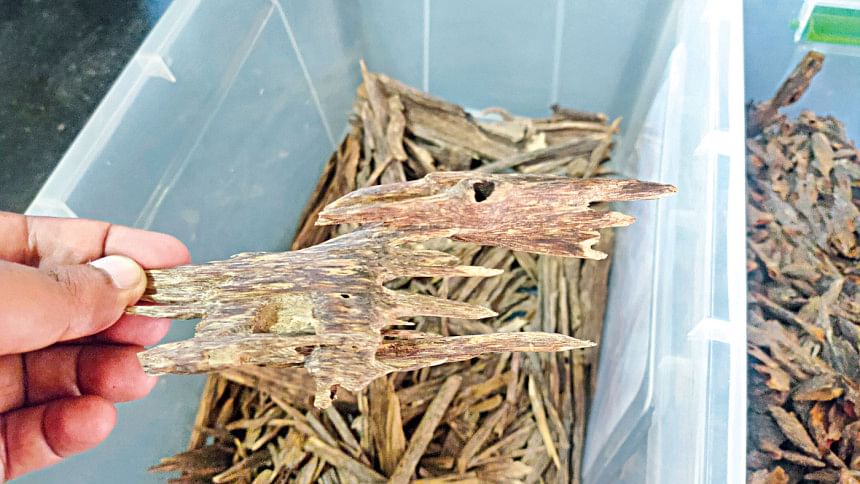Agarwood perfume industry yet to offset pandemic shocks

Bangladesh's agarwood-based perfume industry is struggling to bounce back from the Covid-19 fallouts as traders from the Middle East are yet to resume making purchases in full swing, leaving perfumers and raw material suppliers in the lurch.
Farmers in the country's north-east have kept busy managing forestries of the Aquilaria malaccensis tree and extracting oil from the aromatic resin, which the tree secretes in response to a fungal infection and which coagulates over time to create agarwood.
But their efforts seem to be going to waste amidst a lack of buyers, according to Abdul Batin, a local trader in Barlekha upazila of Moulvibazar.
The agarwood oil, which is used in a blend of fragrances, scented water, incense and creams, is being commercially produced in numerous areas of Sylhet and Moulvibazar.
However, Barlekha upazila is home to the industry's pioneers while Sujanagar union is well known both at home and abroad for the manufacture of the products.
As such, thousands of families in Sujanagar earn a living by processing agarwood either at home or local factories, Batin told The Daily Star.
Bangladeshis own several agarwood perfume factories in Middle Eastern countries such as Kuwait, Saudi Arabia and Dubai while Thailand and Malaysia also use raw materials sourced from Bangladesh.
"I could not sell that much of agarwood perfume for a few months now…sales have not reached around Tk 10 lakh yet," he said.
Processing 30 kilogrammes to 35 kilogrammes of agarwood for 10 days yields about nine ounces of oil.

"I need 15 workers per day…but I have not been able to employ as many due to low sales," Batin added.
Rubel Ahmed Pavel of Uttar Sujanagar village has been cultivating the trees and processing agarwood for a couple of decades.
During a 12-year stay in Dubai, Pavel understood that there was high demand for alcohol-free fragrance oils in the Middle East.
So, he returned to Bangladesh and started the business with his brother.
They collect agarwood oil from their trees and send it to the United Arab Emirates, where another brother sells the rare and precious raw material to local perfumers.
During a recent visit to Sujanagar, this correspondent found many farmers processing agarwood, as November to June is the peak season for extracting the oil.
"So, everyone should be enjoying good business at the moment but at least 80 processing factories have been shut down this year due to low demand amid the ongoing pandemic," said Adib Majid, director of Amena and Fatema Agarwood and Perfume.
The shuttered factories were completely export-oriented and highly labour intensive.
"I usually send 40 litres of agarwood oil to the Middle East by this time every year but this year I have sent just 15 litres so far," he added.
Majid went on to say that Bangladeshi traders in the Middle East have been unable to set up their shops this year as businesses in the region are yet to fully reopen.
"And if the demand from outside Bangladesh does not increase, our recession will not end," he said.
Rubel Ahmed, a small agarwood trader, alleged that he has been facing a lot of difficulties in transporting the raw material from different upazilas.
"Lawmen ask for permits from land, agriculture and forest officials which are impossible to show for truck drivers and labourers," he said.
"Besides, small traders like me are already in bad shape due to Covid-19 and if this situation continues, we will become destitute," Ahmed added.
Ruhul Amin, a worker at a perfume factory in Sujanagar, said thousands of workers in the area have become unemployed and were passing days in hardship due to the lack of orders.
A factory used to employ around 250 people every day but now there is a quiet silence throughout the facilities.
Most traders said they were trying to export some products now after the withdrawal of the latest lockdown but the complex process of obtaining a certification based on the Convention on International Trade in Endangered Species of Wild Fauna and Flora was hindering their efforts.
Ansarul Haque, president of the Bangladesh Agar and Attar Manufacturers and Exporters Association, told this correspondent at least 30,000 people are directly associated with the business.
An estimated 7,000 litres of perfume and 10,000 kilogrammes of agarwood are exported each year.
Around 350 registered and unregistered factories in Sylhet exported agarwood perfume worth about Tk 100 crore last year. This year though, outgoing shipments have not exceeded 10 per cent to 15 per cent of that amount.
Haque believes this is a temporary issue though as the product still has good export potential.

 For all latest news, follow The Daily Star's Google News channel.
For all latest news, follow The Daily Star's Google News channel. 



Comments